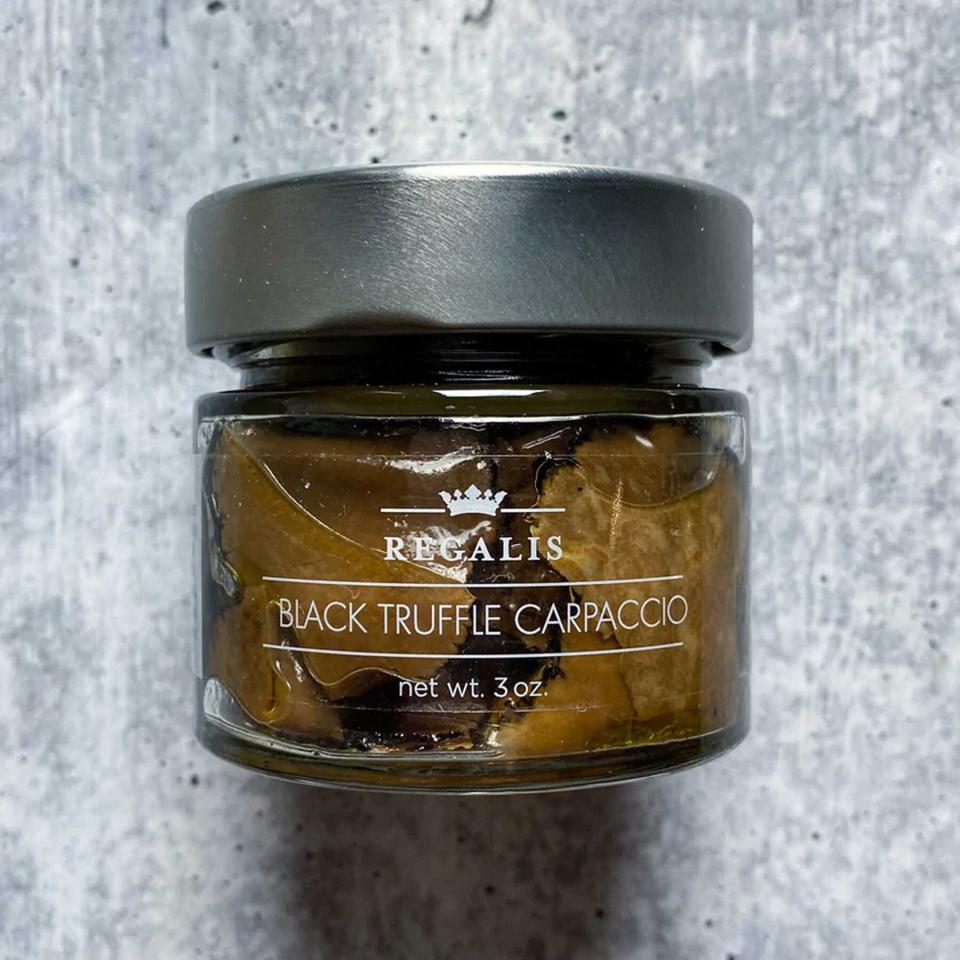Forget Truffle Oil: These Are the Only Truffle Products That Are Actually Worth It, Experts Say

Dana Gallagher
TABLE OF CONTENTS
On This Page
Why You Should Avoid Truffle Oil
Truffle Salt
Truffle Carpaccio
Fresh Is Best
How to Eat Truffle
Truffles are one of the most expensive and precious ingredients on the planet—but what are they, exactly? They are neither vegetable nor animal and though they are regularly mislabeled as mushrooms, they're actually the spore-producing part of a fungus in the Tuberaceae family.
They have a symbiotic relationship with tree roots—and that is typically where they are found. Because they live underground, they give off a strong aroma which attracts the animals that dig them up and helps to disperse their spores, allowing them to reproduce. It's the aroma that truffle connoisseurs are after as a heady topping for everything from eggs and pasta to steak.
Though fresh black truffles can cost $1,500 per pound—and the even-more rare white truffles can cost up to $10,000 a pound and are only available seasonally—there are a wide variety of truffle products that can be purchased year-round at much lower price points. But finding truffle products worth buying and using can be as tricky as finding the real thing, says chef Jason McKinney, the CEO and co-founder of Truffle Shuffle, a company that teaches cooking classes and sells truffles and truffle products.
One way to determine quality is to consider where the products are being sold. "A store such as Whole Foods has stricter regulations for labeling, so they don't allow products with synthetic truffle aroma," McKinney says. Look for natural truffle products—and also pay attention to the origin and other ingredients. Remember, though, that not every product labeled "truffle" is worth your time and money.
Pros Say to Skip Truffle Oil
Perhaps the most common (and controversial) truffle product available on the market is truffle oil. It's no secret that professionals don't like it: Martha and chef Gordon Ramsay have gone on record denouncing it and the late Anthony Bourdain condemned it as "the ketchup of the middle class."
But why do expert chefs stay away from truffle oil? "It's not to be a snob—the synthetic oil is both one dimensional and potent. It obliterates your tastebuds and dilutes your sense of flavor," says Robert Chang, the managing director and chief truffle officer of the American Truffle Company, a company that helps to cultivate truffles, sells them, and also heads up the Napa Truffle Festival.
Real truffles have over 300 flavor compounds that are impossible to replicate synthetically, Chang says. What you're smelling in truffle oil doesn't have anything to do with actual truffles: You're likely getting a whiff of the chemical 2,4-dithiapentane, which only mimics one of the hundreds of compounds present in real truffles.
McKinney, who first tried fresh truffles as an apprentice chef and used them in top kitchens like the French Laundry before launching his own truffle company, also eschews truffle oil. "We've never done a truffle oil because it's very difficult to get the flavor into oil. Producers use a chemical that has a synthetic aroma and just a drop of real truffle," he says. The takeaway? Fancy packaging and a high price tag are not indicators that the oil contains truffles.

Courtesy of Truffle Shuffle
Opt for Truffle Salt
Truffle salt is another common truffle product. It's easy to use—and can be a satisfying way to get a hit of truffle, our experts say. McKinney's company makes Balinese Truffle Salt with porcini powder, Tuber aestivum (also known as the Burgundy summer truffle), and natural yeast, which adds umami. "The Balinese salt is a wet salt, so it holds the powder together really well. It translates better to the food," he says. "I use the truffle salt on everything."
Another bonus? Truffle salt has a longer shelf life. It can last up to 18 months, but we have a feeling you'll use it up by then.

Courtesy of Regalis Foods
Seek Out Truffle Carpaccio
Truffle carpaccio is slices of real truffles preserved in a jar; like fresh truffles, carpaccio is available seasonally. When purchasing this product, make sure you know the vendor: Brands that work with chefs such as Regalis, or are created by chefs like Truffle Shuffle, are a safe bet, but always look at the ingredient list to make sure the product contains actual slices of truffle, Chang says.
An unopened jar of truffle carpaccio will last one year. Once opened, it should be refrigerated and used within seven to 14 days.
Related: What Are Finishing Salts?

Courtesy of Truffle Shuffle
Buy Fresh Truffles If You Can
For the ultimate truffle flavor, opt for fresh truffles if you have the budget to buy them, say our experts. "Know where they are coming from and the vendor—and use them as quickly as you can," says Chang. "Provenance is probably the most important factor—then when was it harvested and how long did it take to reach you?"
Here's the downside: Fresh truffles are highly perishable. "Their half-life is five days. As soon as they are harvested, the aroma continues to off gas into the air, which is why you can smell it across the room," says Chang.
At the Napa Truffle Festival the organizers offer a marketplace for buying fresh truffles vis-a-vis. If you can't buy them in person, turn to specialist vendors who move their inventory quickly to ensure freshness.
Serve Truffles With Fat
Regardless of which truffle product you choose, remember that aroma is everything—but what you serve truffles with or on also matters. "We worked with the renowned culinary scientist Harold McGee, who did a book on aroma and his research helped us to understand the world of truffles," says McKinney. "Truffles need fat in a similar way that cacao needs fat to be chocolate. Truffles always need a rich or fatty component."

